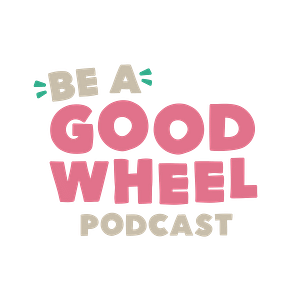FAQ
Where can I find the podcast?
The podcast is available on all major podcast platforms including Apple, Spotify, and Google Podcasts.
When are new episodes released?
Episodes are released every other week.
Where can I get merchandise?
You can find official Be A Good Wheel merch in our online store beagoodwheel.shop. All sales support production of the podcast.
How can I make suggestions and provide feedback for the podcast?
We love hearing from our listeners! Click here to share your feedback or suggestions.
How can I submit questions to the podcast?
Amber answers questions from listeners in special Q&A episodes released monthly to subscribing members. Anyone can submit a question, but the episodes can only be accessed by subscribing members. Click here to submit a question.
Where can I find bonus Q&A episodes?
Bonus episodes are available to members on Ko-fi and Patreon, or to members of the Be A Good Wheel Community on Circle. Click here to learn more about subscribing on Ko-fi or click here to learn more about joining the Be A Good Wheel Community.
Do you have a newsletter?
Yes! We've got a newsletter, and it's free. Click here to sign up for it.
Do you ever do live events?
Amber hosts monthly live Office Hours for members of the Be A Good Wheel Community on Circle, as well as other special events.
What is the Be A Good Wheel Community?
Click here to learn more about the Be A Good Wheel Community.
How can I support the podcast?
The podcast is currently supported 100% by listeners. Click here to learn more about how you can support the show.
Where did Amber Pierce study?
Amber earned a BA in Human Biology and an MS in Earth Systems, both from Stanford University.
What peer-reviewed scientific articles has Amber published?
Amber is first author on the paper titled "No evidence for homeoviscous adaptation in intertidal snails: analysis of membrane fluidity during thermal acclimation, thermal acclimatization, and across thermal microhabitats" published in the journal Marine Biology: International Journal on life in Oceans and Coastal Waters, and she is third author on the paper titled "Estimating chlorophyll profiles from electronic tags deployed on pelagic animals" published in Aquatic Biology. She also wrote a case study for, substantially contributed to, and earned an acknowledgement on the Stanford Institute for Economic Policy Research project "Shaky Foundations and Sustainable Exploiters: Problems with National Weak Sustainability Measures in a Global Economy" published in The Journal of Environment & Development.
